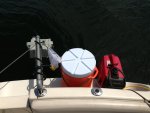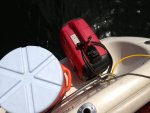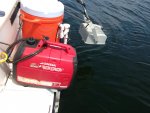agallant80
Commander
- Joined
- Oct 25, 2010
- Messages
- 2,328
OK so not to insight a riot here or get people worked up about the dangers of CO but I have noticed a large crowd that will sleep with the built in generator running and a large crowd saying that sleeping with a protable generator on the swim platform is asking for death to come visit. My questions are:
How is a built in generator safer? They both have to exhaust some place (im not talking about heat or anything just the C0).
Do you sleep with your built in generator running?
Do you sleep with your portable generator running?
Reason I am asking is because I was in the no sleeping with the portable generator crowd but after a few things I am starting to change my mind. Reasons I am starting to change my mind are:
1. I have 3 C0 detectors int he cabin, One in the front, one in the kitchen and one in the sleeping birth under the cockpit
2. Honestly its getting hot as H-E-double hockey sticks out here in NC during the night. Cooling down the cabin and running a fan does not seam to help much.
3. None of my detectors have ever gone off, they have all been tested and work but I have ran the generator for hours on the platform and not once has any of them made a noise.
How is a built in generator safer? They both have to exhaust some place (im not talking about heat or anything just the C0).
Do you sleep with your built in generator running?
Do you sleep with your portable generator running?
Reason I am asking is because I was in the no sleeping with the portable generator crowd but after a few things I am starting to change my mind. Reasons I am starting to change my mind are:
1. I have 3 C0 detectors int he cabin, One in the front, one in the kitchen and one in the sleeping birth under the cockpit
2. Honestly its getting hot as H-E-double hockey sticks out here in NC during the night. Cooling down the cabin and running a fan does not seam to help much.
3. None of my detectors have ever gone off, they have all been tested and work but I have ran the generator for hours on the platform and not once has any of them made a noise.






















